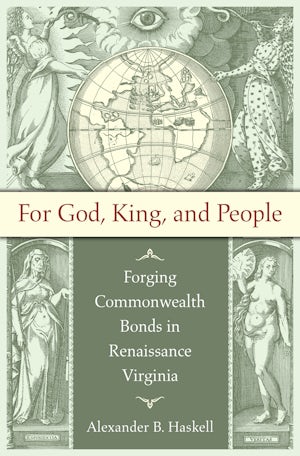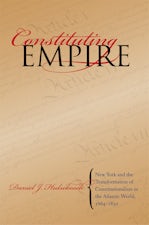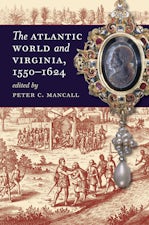For God, King, and People
Forging Commonwealth Bonds in Renaissance Virginia
By Alexander B. Haskell
400 pp., 6.125 x 9.25, notes, index
-
Hardcover ISBN: 978-1-4696-1802-9
Published: June 2017 -
E-book PDF ISBN: 979-8-8908-4769-0
Published: April 2017 -
E-book EPUB ISBN: 978-1-4696-1803-6
Published: April 2017
Published by the Omohundro Institute of Early American History and Culture and the University of North Carolina Press
Buy this Book
- Hardcover $47.50
- E-Book $19.99
For Professors:
Free E-Exam Copies
Published by the Omohundro Institute of Early American History and Culture and the University of North Carolina Press
Rather than just "selling" colonization to the realm, proponents instead needed to overcome profound and recurring doubts about whether God wanted English rule to cross the Atlantic and the process by which it was to happen. By contextualizing these debates within a late Renaissance phase in England, Haskell links increasing religious skepticism to the rise of decidedly secular conceptions of state power. Haskell offers a radical revision of accepted narratives of early modern state formation, locating it as an outcome, rather than as an antecedent, of colonial endeavor.
About the Author
Alexander B. Haskell is associate professor of history at the University of California, Riverside.
For more information about Alexander B. Haskell, visit
the
Author
Page.
Reviews
“Its vast explorations into the providentialist and political underpinnings of Virginia’s founding are impressive. . . . It is a must-read for professors and graduate students focused on English colonization.”--Reading Religion
"Can be read profitably by anyone interested in the early English Atlantic and in early modern ideologies of empire."--Journal of Church and State
“Haskell has written an intellectual history that is deeply grounded in historical events.”--The Journal of Southern History
“Haskell’s history of Virginia articulates in convincing fashion that the colony was not merely a physical space or the seedbed for the mercantile empire that would grow to fruition in later decades.”--William and Mary Quarterly
“Deeply researched, factually dense, and analytically sophisticated…”--Journal of North Carolina Association of Historians
“An intriguing analysis of a variety of texts and debates around early English engagement in the colonisation of the Americas.”--English Historical Review




